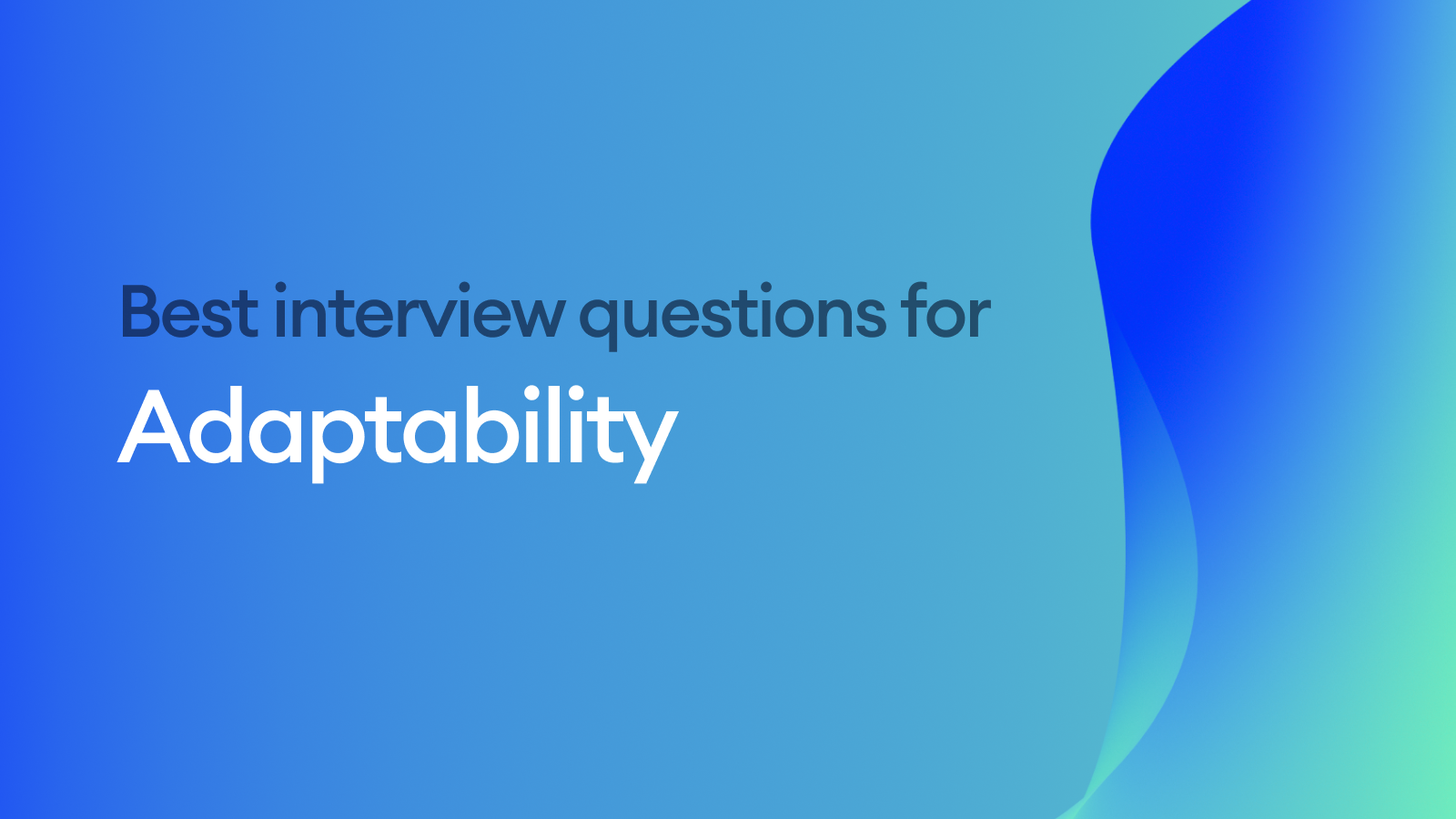In today’s fast-paced and ever-evolving work environment, adaptability has emerged as a crucial trait for success. Employers seek candidates who can seamlessly navigate change, embrace new challenges, and thrive in dynamic settings.
Assessing adaptability during the interview process not only helps in identifying resilient individuals but also ensures that new hires can contribute effectively to the organization's growth and innovation.
This article explores some of the most effective interview questions designed to evaluate a candidate’s adaptability, offers insights into interpreting their responses, and provides tips for thoroughly assessing this essential quality.
What is adaptability?
Adaptability is the ability to adjust quickly and effectively when circumstances, priorities, or information change. It involves staying open-minded, learning fast, and recalibrating actions without losing momentum.
Adaptable employees don’t just tolerate change—they respond to it with curiosity, flexibility, and forward progress.
Why is adaptability an important quality to interview for?
Because change is constant, and rigid thinking slows teams down. Candidates who adapt well can shift direction, learn new tools or processes, and stay productive even when plans evolve.
They reduce friction during transitions, help teams recover faster from setbacks, and perform better in dynamic environments. Interviewing for adaptability helps ensure you hire people who can grow alongside your organization rather than struggle when things shift.
Adaptability interview questions
- Can you describe a time when you had to adjust to a significant change at work? How did you handle it?
- Tell me about a situation where you had to learn something new quickly to complete a task.
- How do you prioritize your work when dealing with multiple deadlines or unexpected challenges?
- Describe an instance where you had to take on a task outside of your usual responsibilities. What was the outcome?
- How do you stay motivated and maintain productivity during periods of uncertainty or change?
- Can you provide an example of how you have adapted your communication style to work effectively with a diverse team?
- Tell me about a project where your initial plan didn’t work. What did you do next?
- How do you handle feedback or criticism that requires you to change your approach or perspective?
- Describe a time when you had to balance conflicting demands from different stakeholders. How did you manage it?
- How do you keep up with industry trends and changes to ensure your skills remain relevant?
What to look for in answers
When evaluating a candidate’s responses to adaptability questions, consider the following aspects:
- Specificity and detail: Look for concrete examples that clearly illustrate how the candidate navigated change or overcame challenges. Vague answers may indicate a lack of real experience.
- Problem-solving skills: Assess how the candidate approached the situation, the strategies they employed, and their ability to think critically and creatively under pressure.
- Resilience and attitude: Gauge the candidate’s mindset when faced with adversity. Positive language and a proactive attitude suggest a high level of adaptability.
- Outcome and impact: Consider the results of the candidate’s actions. Successful outcomes demonstrate effective adaptability, while lack of improvement may be a red flag.
- Learning and growth: Determine if the candidate reflects on their experiences and learns from them. Continuous learning is a key component of adaptability.
Tips to evaluate adaptability in the hiring process
Adaptability shows up in moments of change, uncertainty, and incomplete information—not in perfect, predictable scenarios. To evaluate it well, you need to understand how candidates think, learn, and respond when plans shift.
The tips below will help you uncover real adaptability signals, not just optimistic claims about being “flexible.”
- Observe body language and communication style: Pay attention to how candidates present their stories. Confident and clear communication can reflect their ability to handle stressful situations.
- Assess cultural fit: Ensure that the candidate’s adaptability aligns with your organization’s culture and the specific demands of the role.
- Involve multiple interviewers: Different perspectives can help in comprehensively evaluating a candidate’s adaptability from various angles.
- Incorporate practical assessments: Use role-playing scenarios or case studies that mimic real-life challenges to observe adaptability in action.
- Evaluate responses for consistency: Cross-check answers to different adaptability questions to identify consistent patterns in behavior and attitude.
- Consider the candidate’s learning orientation: Assess their willingness to seek feedback, learn new skills, and embrace continuous improvement.
Make adaptability a priority
Adaptability is a vital attribute in today’s dynamic work landscapes, enabling individuals to effectively manage change, overcome challenges, and contribute to organizational success. By incorporating targeted interview questions, understanding what to look for in candidate responses, and applying strategic evaluation techniques, employers can effectively assess adaptability during the hiring process.
Prioritizing adaptability not only helps in selecting resilient and versatile team members but also fosters a culture of growth and innovation within the organization.
Investing time and effort into evaluating this quality can lead to long-term benefits, ensuring that your team remains agile and competitive in an ever-changing world.
Adaptability FAQs
How can you assess adaptability in an interview?
Ask candidates to describe situations where priorities changed unexpectedly and probe for how they adjusted. Look for evidence of learning, flexibility, and a constructive response to uncertainty.
Is adaptability the same as being open to change?
Not exactly. Openness is a mindset; adaptability is the ability to act effectively when change actually happens.
Can adaptability be developed over time?
Yes. With exposure to new challenges, feedback, and support, most people can significantly improve their adaptability skills.


